Tips for Effective Time Management in Meetings

Introduction
We've all been there – stuck in a seemingly never-ending meeting that takes up valuable time without producing tangible results. As a business or team leader, you understand that effective time management is crucial for the success of your meetings and, ultimately, your organization. It's time to take control of your meetings and turn them into productive and efficient sessions that drive results.
In this article, we'll explore Tips for Effective Time Management in Meetings to help you make the most of your team's time and energy. We'll cover strategies such as setting clear objectives and agendas, streamlining meeting processes, implementing effective communication, optimizing time management techniques, and overcoming common time management challenges. By implementing these strategies, you can transform your meetings into focused, productive, and successful events that contribute to your organization's growth and success. So, let's dive in and discover how to manage time effectively in meetings!
Set Clear Objectives and Agendas
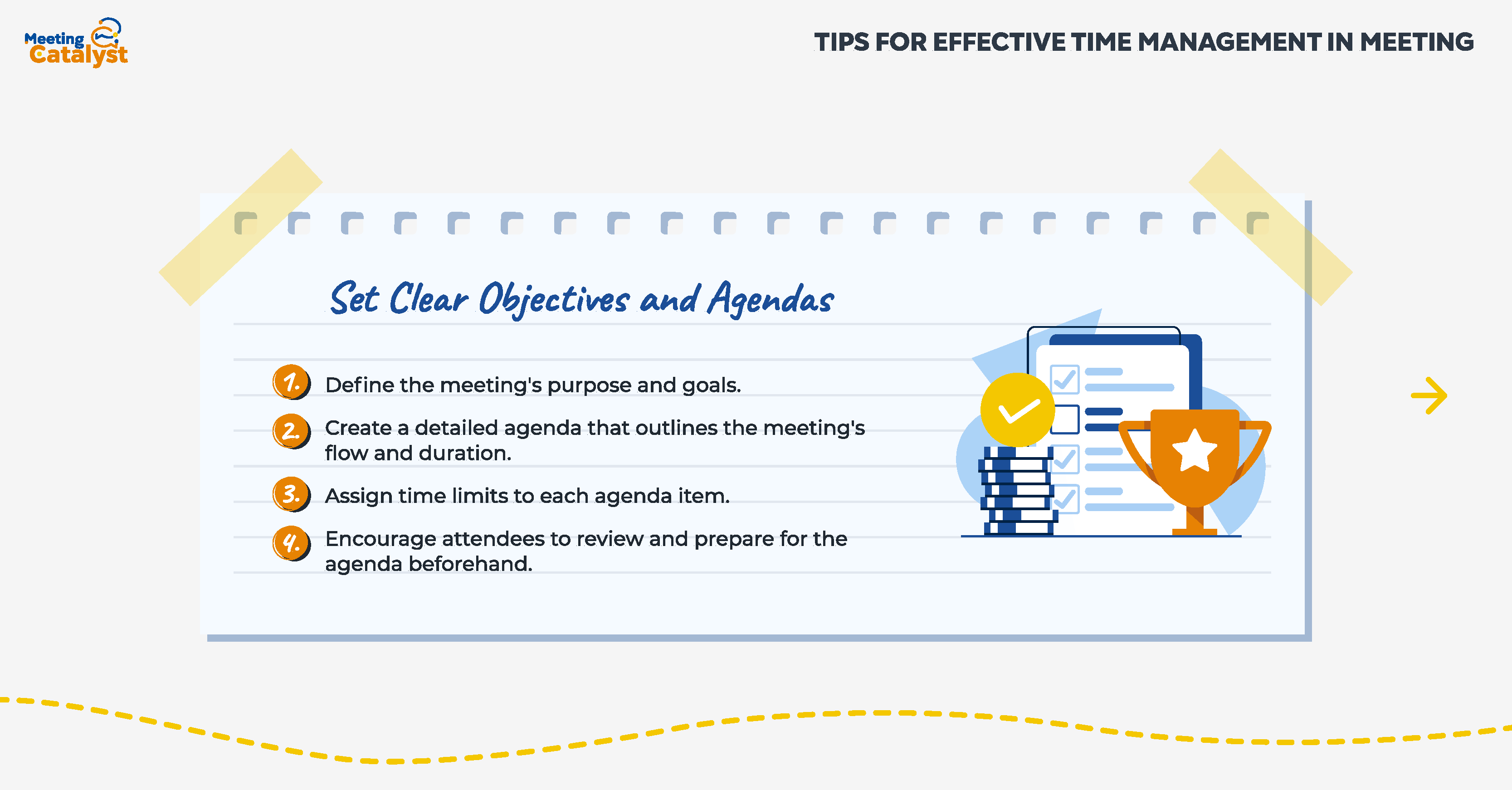
Set Clear Objectives and Agendas
To ensure your meetings are productive and time-efficient, it's essential to set clear objectives and create well-structured agendas. This helps attendees understand the meeting's purpose, stay focused, and contribute meaningfully to the discussion. Here's how you can create effective objectives and agendas:
Define the meeting's purpose and goals: Before even scheduling the meeting, determine its purpose and the goals you want to achieve. Be specific and concise in defining these goals, as this will provide a clear direction for the meeting.
Create a detailed agenda that outlines the meeting's flow and duration: A well-structured agenda acts as a roadmap for your meeting. Break down the meeting into smaller segments, allocating specific time limits for each item. This will help you manage the meeting's pace and ensure that all topics are covered.
Assign time limits to each agenda item: By assigning time limits to each agenda item, you can prevent discussions from dragging on and ensure that the meeting stays on track. Be realistic when allocating time and consider the complexity of each topic.
Encourage attendees to review and prepare for the agenda beforehand: Share the agenda with attendees before the meeting, allowing them enough time to familiarize themselves with the topics and prepare any necessary materials. This will help reduce time spent on clarifications and ensure a smoother flow during the meeting.
By setting clear objectives and creating a well-structured agenda, you lay the foundation for an efficient and productive meeting. It not only helps keep the meeting focused but also ensures that attendees are well-prepared and able to contribute effectively to the discussion.
Streamline Meeting Processes
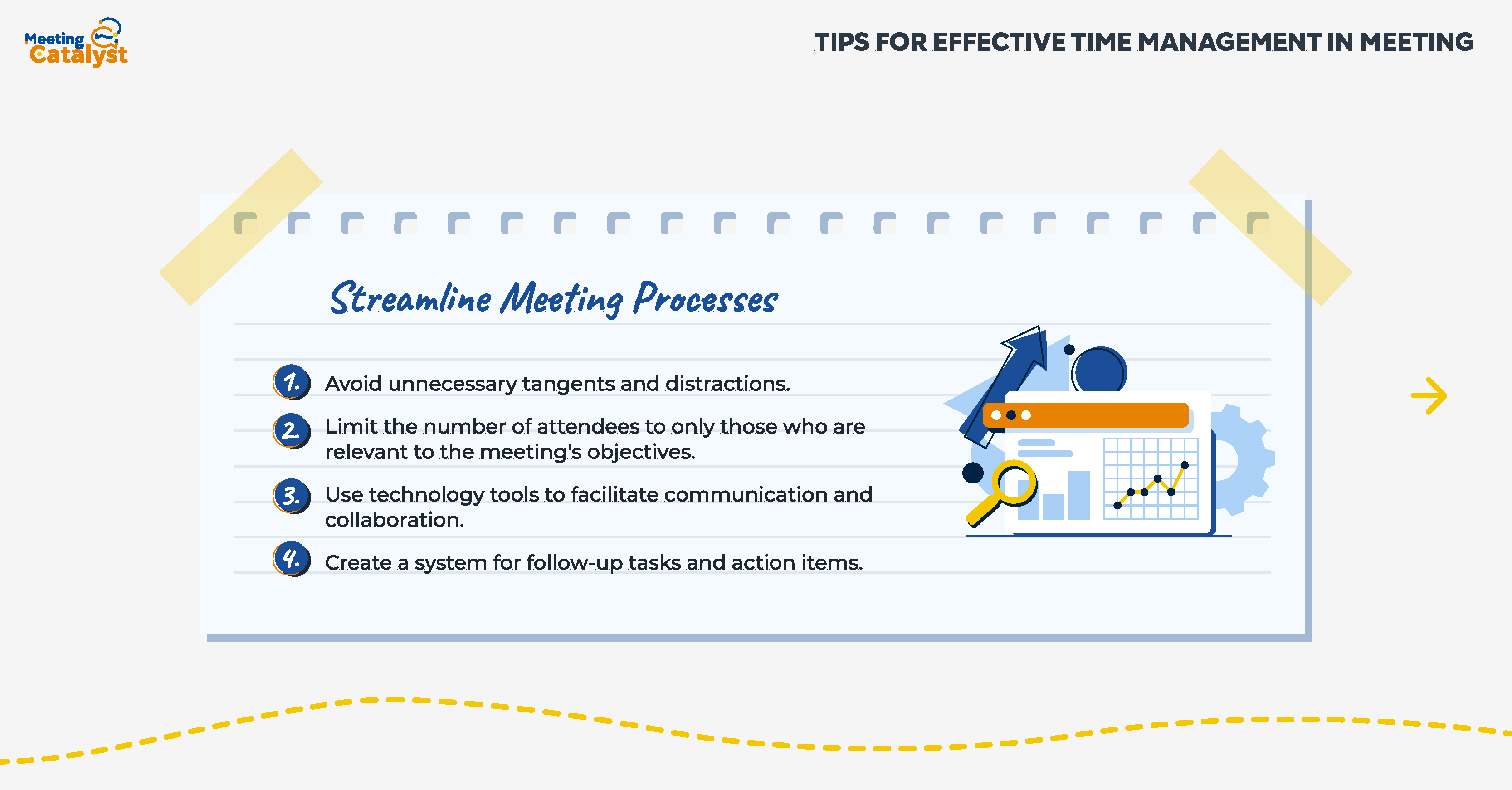
Streamlining your meeting processes can significantly enhance time management and productivity. By eliminating unnecessary distractions and optimizing your workflow, you can create a more focused and efficient meeting environment. Here are some strategies to help you streamline your meeting processes:
Avoid unnecessary tangents and distractions: Keep the discussion on track by gently redirecting conversations that veer off course. Make a note of unrelated topics that may require further discussion and schedule a separate meeting to address them if needed.
Limit the number of attendees to only those who are relevant to the meeting's objectives: Too many attendees can make it difficult to manage time effectively and can dilute the focus of the meeting. Invite only those who are essential to achieving the meeting's objectives, and consider sharing a summary or recording with others who may benefit from the information.
Use technology tools to facilitate communication and collaboration: Utilize tools such as project management software, video conferencing platforms, and real-time collaboration tools to streamline communication and collaboration during meetings. This can help reduce the time spent on repetitive tasks, such as sharing documents or updating project timelines.
Create a system for follow-up tasks and action items: Develop a clear and efficient system for assigning and tracking follow-up tasks and action items during the meeting. This can help ensure that everyone is on the same page and that tasks are completed in a timely manner.
By implementing these strategies, you can create a more streamlined and efficient meeting process. This not only saves time but also helps maintain focus and engagement, ultimately leading to more productive and successful meetings.
Implement Effective Communication Strategies
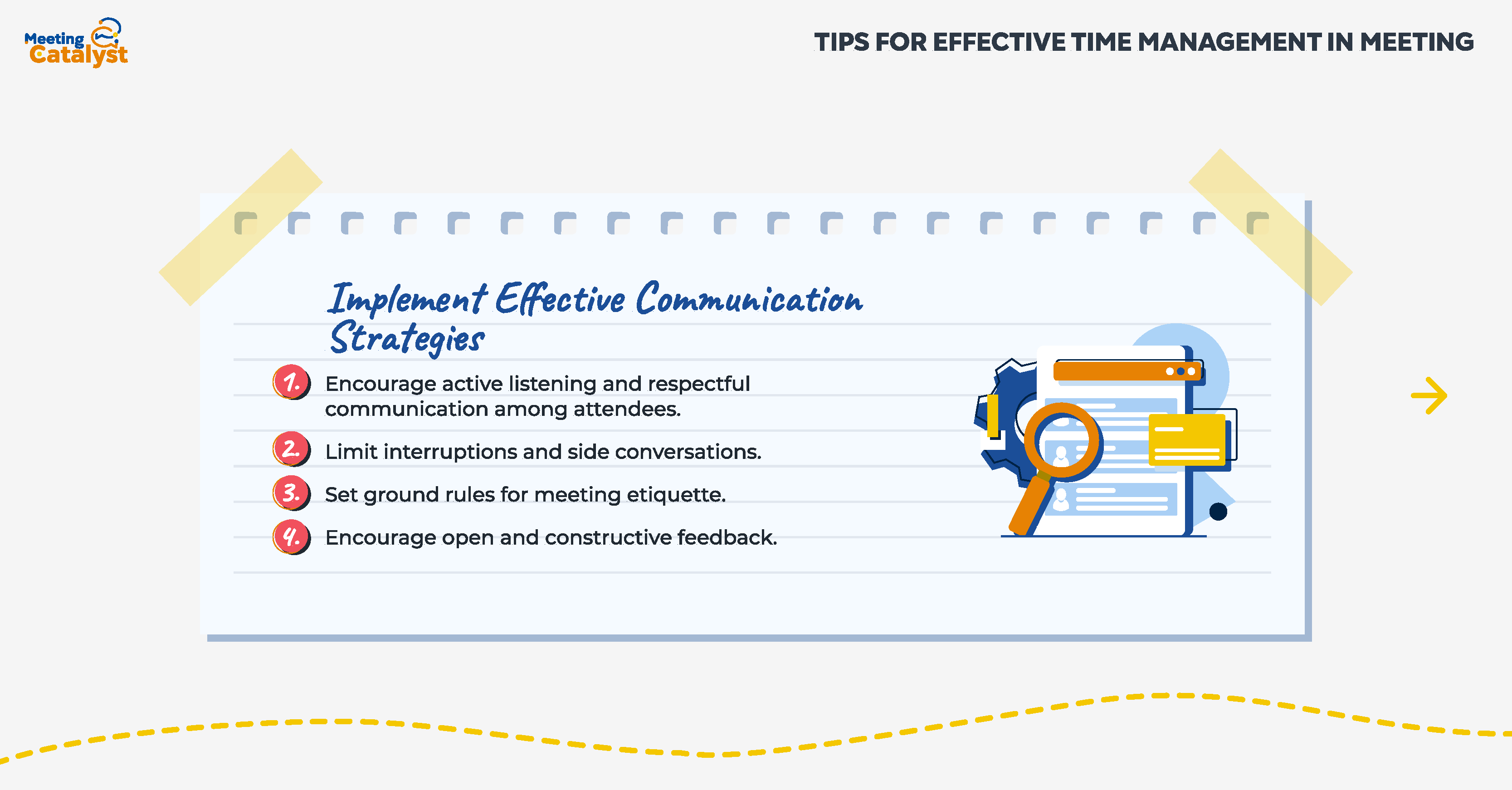
Effective communication is critical for efficient time management in meetings. By promoting clear, respectful, and focused communication, you can ensure that everyone's time is used wisely and that the meeting's objectives are met. Here are some strategies to help you implement effective communication during your meetings:
Encourage active listening and respectful communication among attendees: Foster a meeting environment where everyone feels heard and valued by promoting active listening techniques, such as paraphrasing and asking clarifying questions. Encourage attendees to be respectful and considerate of others' opinions and ideas.
Limit interruptions and side conversations: Establish ground rules at the beginning of the meeting to discourage interruptions and side conversations. This helps maintain focus on the main discussion and prevents time from being wasted on unrelated topics.
Set ground rules for meeting etiquette: Establish and communicate clear expectations for meeting behavior, such as raising a hand to speak, waiting for others to finish speaking before sharing thoughts, and using respectful language. This can help create a more organized and respectful atmosphere, which is conducive to efficient time management.
Encourage open and constructive feedback: Promote a culture of continuous improvement by encouraging attendees to share their thoughts on how the meeting could be more effective. This can help identify areas for improvement and optimize your time management strategies.
By implementing these communication strategies, you can create a more focused and efficient meeting environment, ultimately leading to better time management and more productive meetings.
Optimize Time Management Techniques
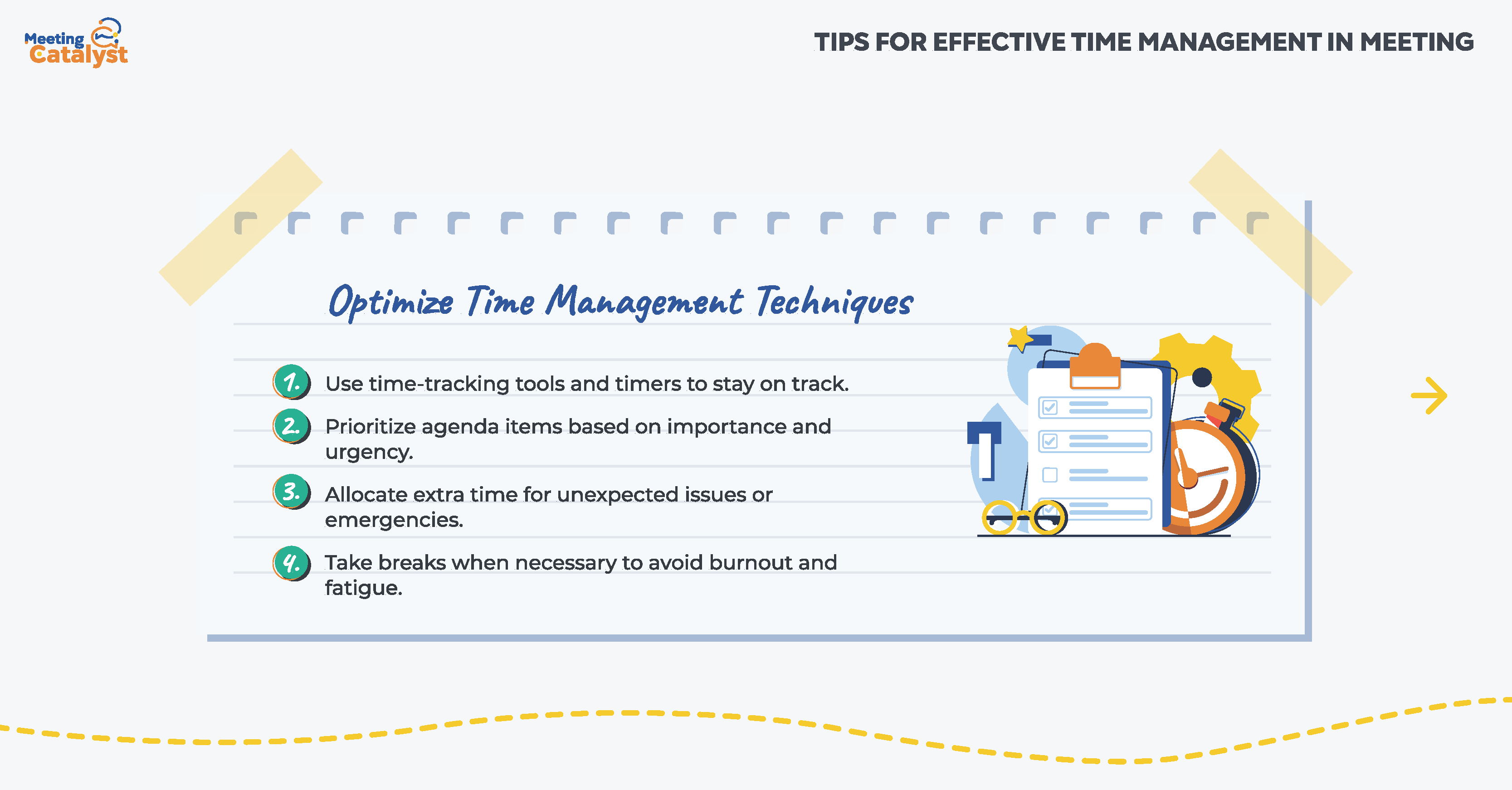
In order to maximize the efficiency and productivity of your meetings, it's essential to optimize your time management techniques. Implementing these strategies can help ensure that your meetings are well-structured, focused, and make the most of everyone's time. Consider the following tips to optimize your time management in meetings:
Use time-tracking tools and timers to stay on track: Utilize tools such as countdown timers or time-tracking apps to monitor the time spent on each agenda item. This can help keep the meeting on schedule and prevent discussions from dragging on longer than necessary.
Prioritize agenda items based on importance and urgency: Allocate more time to high-priority or urgent topics, ensuring that they receive the attention they deserve. This can help maintain focus on the most important issues and prevent less critical topics from taking up too much time.
Allocate extra time for unexpected issues or emergencies: When planning your meeting agenda, set aside some extra time for unanticipated discussions or emergencies. This buffer can help keep your meeting on track, even when unforeseen issues arise.
Take breaks when necessary to avoid burnout and fatigue: Especially in longer meetings, short breaks can help prevent attendees from becoming fatigued or losing focus. Schedule breaks strategically to maintain engagement and productivity throughout the meeting.
By optimizing your time management techniques, you can create a more efficient and effective meeting environment, ultimately leading to better outcomes and increased productivity for your team.
Overcoming Common Time Management Challenges
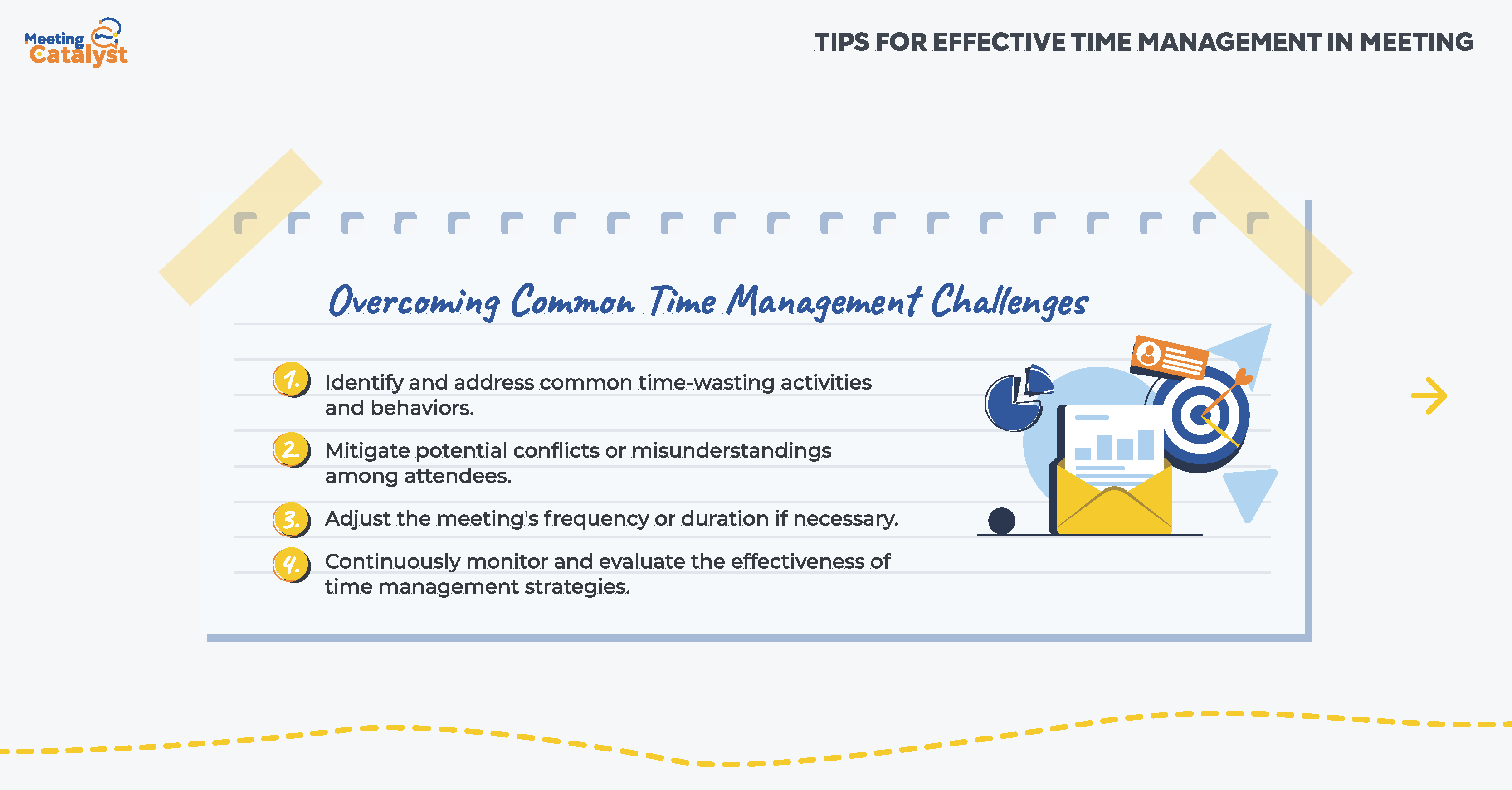
In the pursuit of efficient and productive meetings, several time management challenges may arise. Identifying and addressing these obstacles can greatly enhance the effectiveness of your meetings. Here are some common time management challenges and strategies for overcoming them:
Identify and address common time-wasting activities and behaviors: Pay attention to activities that consistently waste time during meetings, such as unnecessary small talk, repetitive discussions, or off-topic conversations. Address these issues by setting clear expectations and guidelines for meeting conduct.
Mitigate potential conflicts or misunderstandings among attendees: Disagreements or misunderstandings can quickly derail a meeting and consume valuable time. Promote open and respectful communication among participants to quickly address and resolve any potential conflicts.
Adjust the meeting's frequency or duration if necessary: If meetings consistently run over time or lack focus, consider adjusting their frequency or duration. Experiment with different meeting lengths or intervals to find the optimal balance for your team.
Continuously monitor and evaluate the effectiveness of time management strategies: Regularly assess your time management techniques to identify areas for improvement. Solicit feedback from meeting attendees and be open to making adjustments as needed.
By addressing these common time management challenges, you can create a more focused and efficient meeting environment, allowing your team to accomplish more in less time.
Conclusion
Effective time management in meetings is crucial for maximizing productivity and ensuring that your team remains engaged and focused. By implementing the strategies outlined in this article, you can transform your meetings into efficient and purpose-driven sessions that yield tangible results.
In summary, remember to:
- Set clear objectives and agendas for each meeting
- Streamline meeting processes for better focus and efficiency
- Implement effective communication strategies to foster collaboration
- Optimize time management techniques to make the most of every minute
- Overcome common time management challenges that may hinder progress
As a business or team leader, it's your responsibility to create an environment that nurtures productivity and efficiency. By embracing these time management tips, you'll be well on your way to running meetings that inspire, motivate, and produce results. Start implementing these strategies in your own meetings today and witness the transformation that follows.